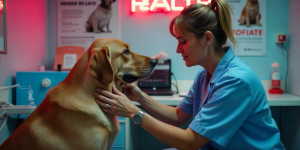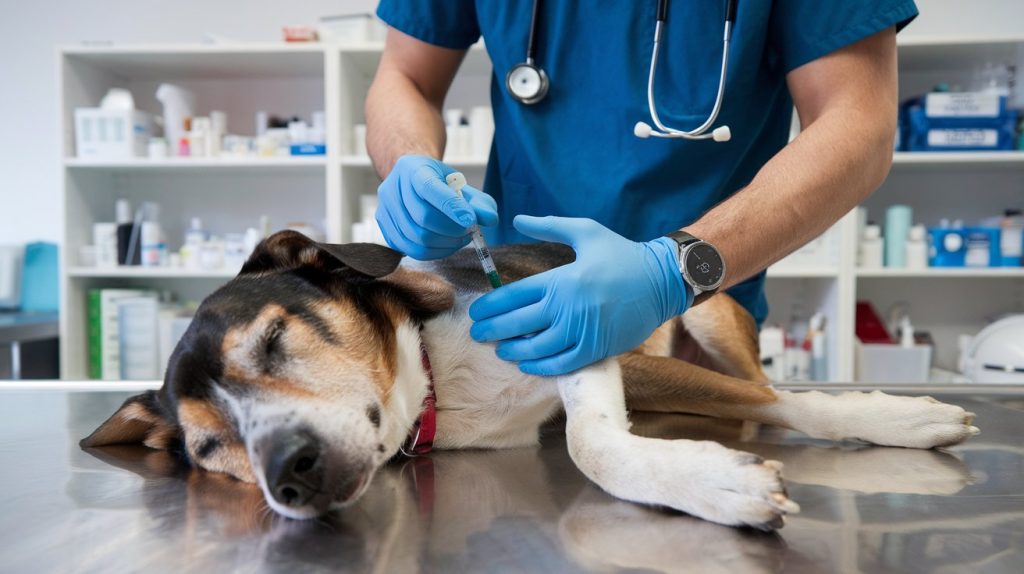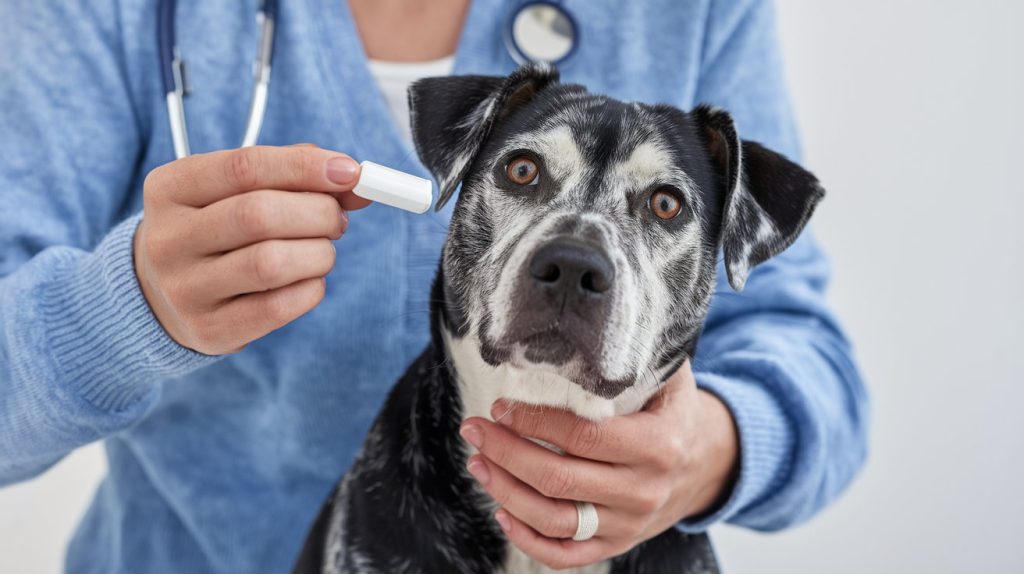As a dog owner, you want the best for your furry friend. You feed them the healthiest food, like the nutritious options available at Value Dog Food, take them on long walks, and make sure they’re up-to-date on their vaccinations. But what happens when you hear rumors that Can a distemper shot cause blindness in dogs suddenly? It’s enough to make any pet parent panic. Let’s break it down in plain, easy-to-understand language so you can make informed decisions about your dog’s health. And while you’re at it, don’t forget to check out the premium dog food options at Life’s Abundance Dog Food to keep your pup in top shape!
Table of Contents
ToggleWhat Is a Distemper Shot, and Why Is It Important?
First things first: the distemper vaccine is one of the core vaccines recommended for dogs. It protects against canine distemper virus, a highly contagious and often deadly disease. Distemper attacks a dog’s respiratory, gastrointestinal, and nervous systems, and it can be fatal if left untreated. Vaccination is the best way to prevent this devastating illness.
But like any medical intervention, vaccines come with potential side effects. Most dogs experience mild reactions, like soreness at the injection site or a slight fever. However, some pet owners worry about more severe consequences, including the possibility of sudden blindness in dogs. Is there any truth to this concern? Let’s dive deeper.
Can a Distemper Shot Cause Blindness in Dogs Suddenly?
Can a Distemper Shot Cause Blindness in Dogs Suddenly? The short answer is: that it’s highly unlikely. There’s no scientific evidence to suggest that the distemper vaccine directly causes sudden blindness in dogs. However, let’s explore why this myth might exist and what could actually be happening.
1. Allergic Reactions
In rare cases, dogs can have an allergic reaction to a vaccine. Symptoms might include swelling, hives, or difficulty breathing. While severe reactions can be scary, they don’t typically affect the eyes or cause blindness. If your dog has a history of allergies, your vet might recommend pre-treatment with antihistamines before vaccination.
2. Autoimmune Responses
Some people speculate that vaccines could trigger an autoimmune response, where the body mistakenly attacks its own tissues. For example, a condition called uveitis (inflammation of the eye) could theoretically occur. However, this is extremely rare and usually treatable if caught early. It’s also not specific to the distemper shot—it could happen with any vaccine or even an infection.
3. Coincidental Timing
Sometimes, unrelated health issues arise around the same time as vaccination. For instance, a dog might develop sudden acquired retinal degeneration syndrome (SARDS), a condition that causes rapid vision loss. While SARDS is devastating, it’s not caused by vaccines. It’s just a tragic coincidence that can happen at any time.
Real-Life Stories: Separating Fact from Fear
Let me share a story to put this into perspective. A friend of mine, Sarah, has a golden retriever named Max. Max got his routine distemper shot at his annual check-up. A few days later, Sarah noticed Max bumping into furniture and seeming disoriented. She immediately feared the worst—that the vaccine had caused blindness in dogs.
After a thorough examination, the vet discovered that Max had developed glaucoma, a condition where pressure builds up in the eye, damaging the optic nerve. It had nothing to do with the vaccine. Max’s symptoms just happened to appear around the same time as his vaccination. With proper treatment, Max’s condition was managed, and Sarah learned the importance of not jumping to conclusions.
Step-by-Step Guide: What to Do If You’re Worried About Vaccine Side Effects
If you’re concerned about your dog’s health after a distemper shot, here’s a step-by-step guide to help you navigate the situation:
Observe Your Dog Closely: After vaccination, keep an eye on your dog for any unusual behavior or symptoms. Mild lethargy or soreness is normal, but severe reactions warrant immediate attention.
Contact Your Vet: If you notice anything concerning, like swelling, vomiting, or changes in vision, call your vet right away. They can advise whether your dog needs to be seen.
Rule Out Other Causes: If your dog experiences sudden blindness, don’t assume it’s the vaccine. Conditions like SARDS, glaucoma, or cataracts could be the culprit. A thorough eye exam by a veterinary ophthalmologist can provide answers.
Trust the Science: Remember, the benefits of vaccination far outweigh the risks. Canine distemper is a deadly disease, and the distemper shot is your dog’s best defense.
Stay Informed: Talk to your vet about any concerns you have. They can provide personalized advice based on your dog’s health history.
Why Vaccination Is Still the Best Choice

It’s natural to worry about your dog’s health, but avoiding the distemper vaccine isn’t the answer. Canine distemper is a serious threat, and vaccination is the most effective way to protect your pet. According to the American Veterinary Medical Association (AVMA), the risk of severe side effects from vaccines is extremely low.
Think of it this way: you wouldn’t skip your child’s measles vaccine because of a rare side effect. The same logic applies to your dog. The distemper shot saves lives, and the chances of it causing blindness in dogs are virtually nonexistent.
How to Ensure Your Dog’s Safety During Vaccination
Here are some tips to make the vaccination process as safe and stress-free as possible:
Choose a Reputable Vet: Work with a licensed veterinarian who follows proper vaccination protocols.
Discuss Your Dog’s Health History: Let your vet know if your dog has had previous reactions to vaccines or any underlying health conditions.
Monitor for Reactions: Keep an eye on your dog after vaccination and report any concerns to your vet.
Stay Up-to-Date: Follow your vet’s recommended vaccination schedule to ensure ongoing protection.
FAQs: Can a Distemper Shot Cause Sudden Blindness in Dogs?
1. Can a distemper shot really make my dog go blind suddenly?
No, there is no scientific evidence linking the distemper vaccine to sudden blindness in dogs. While severe reactions to vaccines are rare, blindness is not a documented side effect. Symptoms like vision loss are more likely caused by unrelated conditions such as glaucoma, SARDS, or injuries.
2. What are the actual side effects of the distemper vaccine?
Most dogs experience mild, short-lived reactions, including:
Soreness at the injection site
Low energy or mild fever
Reduced appetite
Severe reactions (e.g., vomiting, facial swelling, or difficulty breathing) are rare but require immediate vet care.
3. Why do some people blame vaccines for sudden blindness?
This myth often stems from coincidental timing. For example, a dog might develop an unrelated eye condition like sudden acquired retinal degeneration syndrome (SARDS) shortly after vaccination, leading owners to mistakenly link the two. Always consult a vet to identify the true cause.
4. What should I do if my dog loses vision after a vaccine?
Stay calm and contact your vet immediately. Sudden blindness is a medical emergency, but it’s unlikely to be vaccine-related. Your vet will check for conditions like retinal detachment, cataracts, or neurological issues. Early treatment can often save your dog’s sight.
5. Are certain dogs more at risk for vaccine reactions?
While any dog can have a reaction, breeds prone to autoimmune disorders (e.g., Akitas or Weimaraners) may have a slightly higher risk. However, severe reactions are still extremely rare. Discuss your dog’s health history with your vet to minimize risks.
6. Should I skip the distemper shot to avoid risks?
No. The risk of canine distemper—a deadly, highly contagious disease—far outweighs the almost nonexistent risk of blindness. Unvaccinated dogs are vulnerable to outbreaks, especially in areas with wildlife (e.g., raccoons or foxes).
7. How can I reduce the risk of vaccine side effects?
Choose a licensed veterinarian for vaccinations.
Share your dog’s full medical history with your vet.
Monitor your dog for 24–48 hours after the shot.
Ask about splitting combo vaccines if your dog is sensitive.
8. What’s the difference between SARDS and vaccine reactions?
SARDS (Sudden Acquired Retinal Degeneration Syndrome) causes rapid, irreversible vision loss due to retinal damage. It’s not caused by vaccines—its exact cause is unknown. Symptoms like sudden blindness, weight gain, or increased thirst may mimic other issues, so always get a vet’s diagnosis.
9. Can vaccines cause eye inflammation (uveitis)?
In extremely rare cases, vaccines might trigger immune-mediated uveitis (eye inflammation), but this is not specific to the distemper shot. Uveitis is treatable with medication if caught early, and it doesn’t cause sudden blindness on its own.
10. Where can I report a suspected vaccine reaction?
If you believe your dog had a severe reaction, report it to:
The Vaccine Adverse Event Reporting System (VAERS)
Your vaccine manufacturer
This helps improve vaccine safety for all pets.
Final Thoughts: Don’t Let Fear Dictate Your Decisions
Can a Distemper Shot Cause Blindness in Dogs Suddenly? As pet owners, we want to do everything we can to keep our dogs healthy and happy. While it’s important to be aware of potential risks, it’s equally important not to let fear overshadow the benefits of vaccination. The distemper shot is a safe and effective way to protect your dog from a deadly disease.
If you’re still feeling unsure, talk to your vet. They’re there to help you make the best decisions for your furry friend. And remember, the bond you share with your dog is built on love and trust—don’t let misinformation weaken that bond.
Call to Action: Protect Your Dog with Confidence
Ready to schedule your dog’s next distemper shot? Don’t wait—take action today to ensure your pet’s long-term health. Click here to find a trusted veterinarian near you and book an appointment. Your dog deserves the best care, and you deserve peace of mind.
By staying informed and proactive, you can protect your dog from canine distemper without worrying about unfounded risks. Vaccination is a small step that makes a big difference—so let’s keep our furry friends safe, healthy, and happy!




